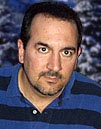A lot of TV execs just don’t get it. Someone should tell them the so-called “future of news” is happening already. While many of them try more and more sensational ways to get the attention of viewers, they still pass off the Internet and the Digital Age as a fad that will eventually pass. In many newsrooms, 30-yr olds laugh and say ‘all I know about computers is how to turn them on”. Many, way too many in my opinion, have the latest plasma TVs and two DVD players in their homes-but no computer. They talk like Broadband will never catch on. They think AOL is the Internet. The last time they saw broadcast news on-line it was in a tiny little box and the video kept freezing. They just didn’t see the threat. Like dinosaurs…yet dying too young in this case. They don’t see the future because many don’t want to. Many in television news don’t embrace change, because it takes away the sense of control they thought they had over their careers and lives. After all, when the first Avids showed up in TV Newsrooms, the older photogs went nuts worrying about the day some young reporter was going to take away their editing jobs. In some cases, it did happen. But for the most part the editors I know changed, and learned non-linear, and were more valuable to their respective newsrooms as a result. Some are too arrogant to change course at this stage of the game. CBS news president Andrew Heyward told me when I launched the TVNewz site that the Internet will not take away significant viewers from traditional broadcast television ‘in our lifetimes’. But it already has. Mr. Heyward is thinking Inside the box. He and others can’t imagine people going to the computer and watching a little square broadcast when they could watch TV in the comfort of their living rooms. But people aren’t trying to replicate the traditional experience! That’s the problem! Young viewers are NOT replacing TV news with Internet TV news. They’re simply not watching traditional newscasts and are instead getting what they perceive to be more relevant information from other sources. Ed Bradley of 60 Minutes told me he likes to check news from other markets on the ‘Net, but until he can get dressed and listen to it in the background it will never be among his sources for news each day. Again, thinking Inside the box. The Internet does everything they speak of already. Internet radio is already blending the car radio dial into a myriad of niche options much like cable TV did to broadcast television ten years ago. We must realize that viewers have changed already, and it only matters if we change with them if we plan on being around after the Ice Age, or digital revolution if you will. News Managers need to stop with the cliché excuses. Viewers aren’t just ‘going to cable’. Viewers don’t just choose one source of news anymore. Not young viewers anyway. And please, enough with all the news research. Don’t TV execs know any real people? Are they too far removed from real life to observe how people live these days? How no one can sit down for family dinner together anymore, never mind watch a newscast together at a given time of day. Sometimes we as journalists need to look around, and stop producing for other journalist’s approval. Look at life around you. Some aren’t capable of that objectivity after being in newsrooms for so long. Others see it clearly only after it is too late. They are ‘on the beach’ when they realize that viewers don’t hang on our every word anymore, like they did when Walter Cronkite was their anchor and they had only three TV choices at 6pm, all of them newscasts. We in TV always thought we were different. Like in a news meeting someone will say “hey let’s do a two-parter on the PBS special on aids tonight!”. Then we all go home and watch the final episode of American Idol that night and get on-line and look for our friends. We think we as TV people don’t count, we’re not ‘normal’. So we must not accurately reflect the community of viewers we’re supposed to be serving. Talk shows on radio are now helping decide elections. The internet is filled with opinionated news and most young folks can’t tell or don’t care and that’s their only source for news in many cases. The first ‘danger’ to purists came along
with Hard Copy and other magazine-style news genre shows. Somehow the
line blurred, and we in traditional newsrooms cringed when viewers would
call us all “The Media” .MTV news may have been the first
TV alternative to real news for young people. Now not-so-young people
head to the Drudge report. Or listen to Rush on the way home and then
call newsrooms and yell at us for being so liberal and being part of
a big conspiracy to ruin their lives. So the young news consumer gets rumor and has to sort it out. They won’t hear of any of us calling ourselves ‘experts’ and insisting we are the true objective deliverers of information. After all, Rush and Michael Savage and Dr. Laura and everyone else has made sure this generation of news viewers will never trust us to be objective. Maybe we earned the mistrust. Maybe it’s just that viewers want to control the input of multiple sources of information and choose what to believe themselves. That’s not too different than having young journalists sort it out for you is it? So if you want to know the weather, look out
your window. And if you want to see the future of TV news, just look
around you. It’s happening right before your eyes. All you have
to do is open them. © Jim Parisi
|
|
|
Write a Letter
to the Editor |
